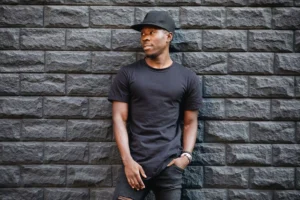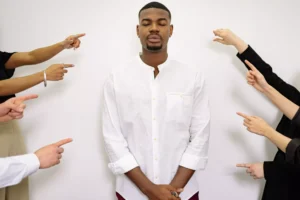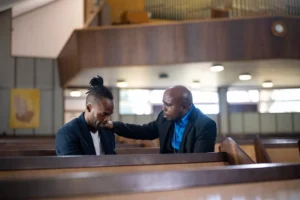PART 1: To Judge or Not To Judge »
“Zack, I don’t think you know what you’re asking. You want me to take the splinter out of your eye, but I’ve had enough logs removed from my own eyes to make a forest.”
He sat down. “That’s no answer. It just means you’ve had a lot of experience removing them.”
“Only because they keep getting back in.”
“You’ve advised me about other things. Lots of times.”
“This is different. ‘Judging with right judgment’ is just as difficult for me as it is for you. Your temptation is to try not to judge; mine is to judge too readily. When I was your age I was a regular Pharisee.”
“But Professor Theophilus, if you were still a Pharisee I wouldn’t be asking your advice. I’m asking because you’re a repentant former Pharisee. Couldn’t you tell me what you learned from repenting?”
I mulled it over. “I suppose I could do that.”
He grinned.
“All right,” I said. “You already understand that you have to make judgments of character and avoid bad companions. Take that as given. The most important thing I learned is that when you avoid them, you shouldn’t do it because you think you’re too good to be with them, but because you’re not good enough.”
“How’s that again?”
“Think of it this way. The counsel to avoid bad companions is biblical. Why does the Bible warn against them?”
“I suppose because they might influence us. Maybe also because our example might have a bad effect on other people.”
“Right. Now concentrate on the first reason — that they might influence us. What does that say about us?”
“I guess — that we’re susceptible.”
“Yes, exactly. So our character isn’t much too brag about either.”
“What about Jesus?”
“What about Him?”
“Well, the Pharisees criticized him for associating with notorious sinners like prostitutes, drunks, and tax-collectors, didn’t they?”
“Yes. So?”
“We should do what Jesus did. So it seems that we shouldn’t avoid people because of their way of life.”
“Whoever told you that you can do everything that Jesus did?”
“You know – ‘WWJD.’ Doesn’t that come from the Bible?”
I smiled. “I think it comes from a bracelet.”
“But — ”
“Jesus was the Son of God; not everything he did was for our imitation. We should imitate Him, yes, but only in the ways that he taught us to do so. Jesus Himself taught that we should avoid certain people.”
“He said that?”
“Look it up. In Matthew 18, for example, he said that if your faith-brother commits serious wrong against you but won’t accept patient correction — from you, from witnesses, or even from the church — then you should treat him ‘as you would a pagan or a tax collector.'”
“But He didn’t treat the tax collectors like tax collectors. He had dinner with Zacchaeus, he called Matthew to be a disciple — ”
“Jesus came to seek lost sheep, and so He did. He didn’t pal around with the ones who wanted to stay lost. Do you see the difference between sharing the gospel with a drunk, and hitting the bars with him?”
“Sure, but — ”
“But what?”
“What’s wrong with, say, establishing a street mission?”
“Nothing. At least, so long as you don’t try to be a Lone Ranger. Jesus sent out the disciples two by two — probably so that they could encourage each other and hold each other accountable to what they set out to do.” I laughed. “But Zack, isn’t all that beside the point?”
“How is it beside the point? Why are you laughing?”
“You’ve forgotten how all this came up.”
“No, I haven’t.” His eyes glinted. “My friends were criticizing me for associating with ‘pagans and tax collectors.'”
“The ‘pagans and tax collectors’ in this case being Cleo and Anton.”
“Right.”
“And I suppose you were sharing the gospel with Cleo and Anton in a street mission — right? Is that why your friends were so worried?”
“Well, no. It was more like — well — ”
“Go ahead.”
“Hanging out. You know.”
“Hanging out? Doing what?”
“Different things. Going to hear music and — stuff. Stop looking at me like that.”
“Sorry. Do you want to tell me about the stuff?”
Zack tried to look nonchalant.
“Anyway, nothing wrong with innocent music.”
“That’s what I say,” he said.
“Music you could take Jesus to hear, eh?”
His look changed.
I waited him out.
“All right,” he quavered. “Maybe Cleo and Anton did influence me a little.”
“Maybe that was why your other friends were worried a little.”
His voice became firmer. “But they didn’t know about any of that.”
“No?”
“They just thought it — because of how Cleo and Anton looked. And that still burns me.”
“Why should it burn you?”
“You can’t judge a book — ”
” — by its cover. You said that before. And I said I thought sometimes we can. Would you like to talk about the covers on these two ‘books’?”
“Well, I did say I wanted to learn to ‘judge with right judgment.’ So yes.”
“You mentioned that Anton wears Satanic clothing.”
“Just the T shirt. Well, the chains too. And some other little things. But he says it doesn’t mean anything.”
I raised an eyebrow. “People say they wear their clothing to express themselves, but as soon as you ask what they’re expressing, they say it doesn’t mean anything.”
“Anton’s not a Satanist, if that’s what you mean. It’s all a put-on. The only thing he’s expressing is his sense of humor.”
“I didn’t think you’d hang around with a real Satanist, Zack.”
“You didn’t? Then why — ?”
“Because even if he does wear those things just to be funny, doesn’t that raise a question?”
“What question?”
“Why he thinks it’s funny.”
Zack shifted in his seat. “I don’t know. There might be a lot of reasons.”
“I can think of a lot of reasons too. But can you think of any good ones? Of any innocent reasons to make a joke of radical evil? Imagine yucking it up about Jeffrey Dahmer or the Holocaust.”
“Since you put it that way – no, I can’t.” He met my eyes again. “Prof, what does that say about me? I, well, I sort of thought it was funny, too.”
“Good question. Keep asking yourself.”
He sighed.
I asked, “What was the other thing about him that you mentioned?”
“The piercings.”
“Now I remember. You said that the metal set off security alarms.”
“Uh huh. But he only got them for decoration.” Zack looked up. “You’re going to shoot me down again, aren’t you?”
“How am I going to shoot you down?”
“You’re going to ask ‘Why would a person consider it decorative to make holes in himself?'”
“I was going to ask a different question, but that one will do. What do you think is the answer?”
“I guess he wants attention. Maybe he wants to shock people.”
“By wearing his Satanist gear, isn’t he already doing those things?”
“True. And the piercings are where you can’t see them anyway. I guess I don’t know why he gets them. And I have to admit that to have a two-inch screw driven through his — ”
“Don’t tell me where.”
” — is pretty self-destructive.”
“Has it occurred to you that bodily self-destruction might be the purpose?
Zack goggled. “Why would he hate his own body?”
“I don’t know. What has he been doing with it to make it hateful?”
“Wouldn’t it be easier to just shoot himself or something?”
“You’d think so, but most people who destroy themselves use slower methods.”
“I guess you’d see Cleo’s tattoo the same way.”
“As an expression of self-contempt? You figure it out. A poisonous serpent crawling from her navel downward — isn’t the symbolism pretty obvious?”
“But like I told you, Prof, she says it’s just a joke on her name. The historical Cleopatra killed herself by letting a viper bite her, so Cleo uses a viper as her personal I.D.”
“That just makes the symbolism plainer. What do names and I.Ds represent?”
“Ourselves.”
“So what three things does that I.D. tattoo link together?”
“Um — herself, I guess.”
“That’s one.”
“Suicide.”
“Go on.”
“And, well, sex.”
“That’s how I read it too. Self, sex, and poisonous self-destruction. ”
“But she doesn’t talk anything like that!”
“She doesn’t have to. The tattoo says it all, and you said yourself that she dresses so that it can’t be missed. The meaning couldn’t be plainer if she’d branded herself, poor girl.”
“I thought she was so clean-minded.”
“The most likely explanation of that — what was that word you used earlier? — how you said she seemed but really wasn’t?”
“Skanky?”
“That’s it. Can I say ‘skankiness’? Is that a word too?”
“Yeah, I’ve heard it.”
“The most likely explanation is that you were attracted to her because of her skankiness — but, just because you were attracted to her, you convinced yourself that she wasn’t skanky.”
Zack’s ears and cheeks turned bright red. I let him sit for a few minutes while I busied myself with the coffee maker. By the time I sat back down, his color was normal. He said ‘No’ to coffee, and glanced at his watch.
“Have to get to class?” I asked.
“Yes. But, uh, can I say one more thing before I leave?”
“Shoot.”
“I thought this ‘judging with right judgment’ business was going to be all about other people. You know, being down on Cleo and Anton.”
I took a sip of coffee and listened.
“But it’s turned out to be more about me.”
I smiled. “Isn’t that what I said it should be?”
Copyright 2002 J. Budziszewski. All rights reserved.









